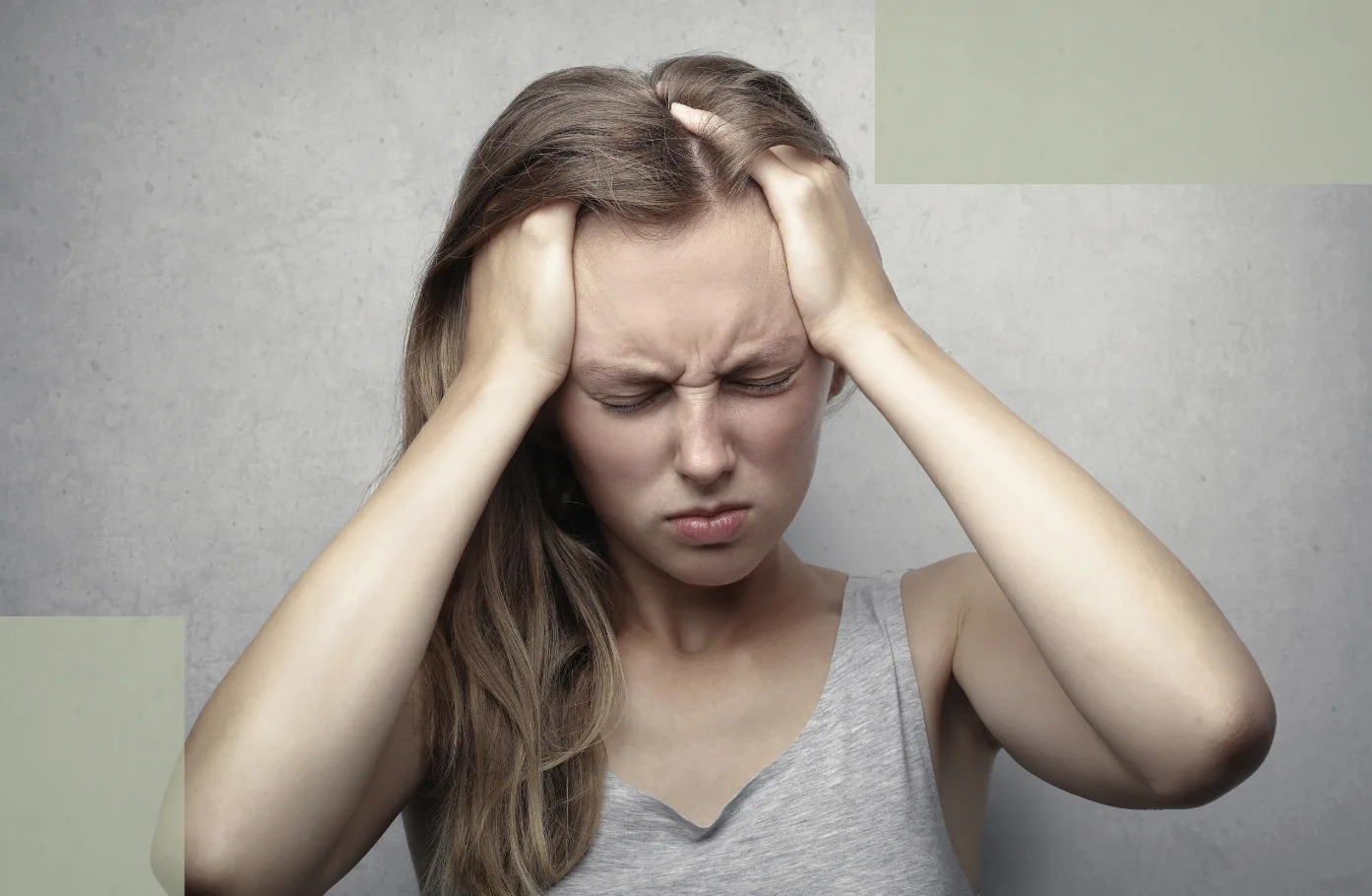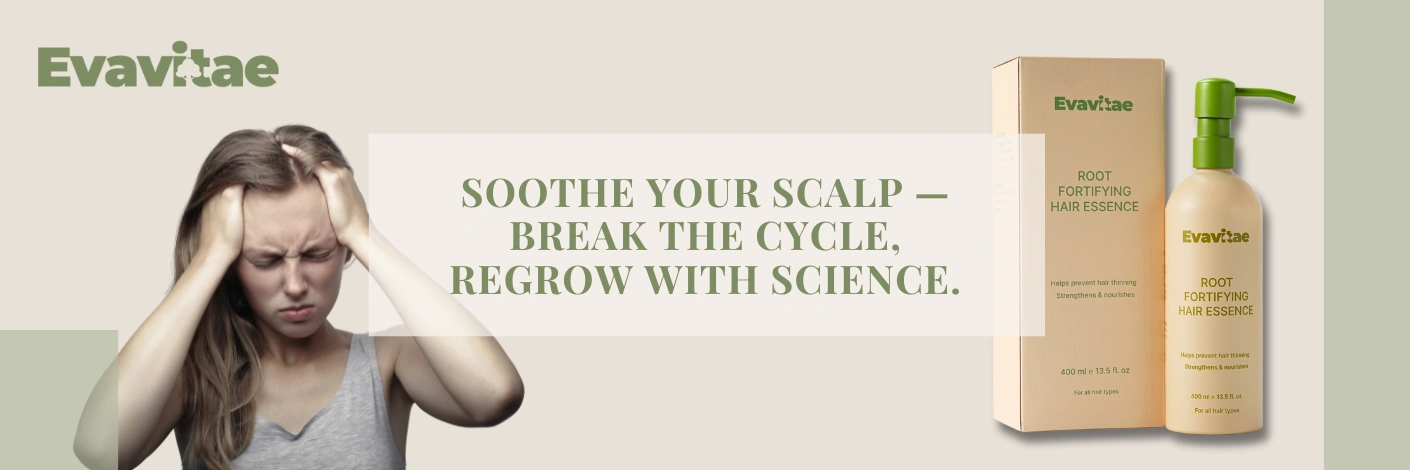
In today’s fast-paced world, stress hair loss has become increasingly common — especially among women.
When chronic stress, lack of sleep, and emotional fatigue build up, your scalp’s blood flow and hormonal balance are disrupted.
This not only causes thinning and excessive shedding but can also leave the scalp barrier weak and overly sensitive.
The good news? Stress-induced hair loss is reversible.
With the right scalp care, nutritional support, and emotional balance, you can break the cycle and help your scalp recover its rhythm.
✨ Continue learning about prevention, early signs, and gentle recovery steps in the Hair Loss 101 Hub.
1. Why Stress Triggers Hair Loss
Our hair follicles don’t work in isolation — they are deeply connected to the nervous and endocrine systems.
Under prolonged stress, your body releases high levels of cortisol, the stress hormone.
According to Mayo Clinic,
“Chronic stress can cause temporary hair loss (Telogen Effluvium), but with proper scalp recovery and relaxation, hair growth often returns within 3–6 months.”
High cortisol levels can:
- Suppress follicle stem cell activity, shortening the growth phase
- Restrict blood flow and oxygen supply to the scalp
- Overactivate sebaceous glands, leading to buildup and inflammation
For many women — referred to in studies as stress hair loss female or hair loss stress female — this cycle is triggered by emotional overload, hormonal imbalance, or prolonged tension.
2. Signs You’re Experiencing Stress Hair Loss
Symptom | What It Means |
Noticeable hair thinning | Losing over 100 strands per wash or comb |
Finer, softer hair texture | Shortened growth phase due to poor circulation |
Red, itchy, or oily scalp | Sebum overproduction linked to stress hormones |
Scalp sensitivity or tenderness | Local inflammation affecting nerve endings |
Poor sleep, hormonal changes | Common signs of chronic cortisol imbalance |
3. How to Break the Stress–Shedding Cycle
①Balance Your Nervous System
- Maintain 7–8 hours of consistent sleep daily.
- Try relaxation techniques like meditation, deep breathing, or warm foot baths.
- Cut down on caffeine and alcohol, both of which raise cortisol levels.
②Improve Scalp Circulation
Stress causes microvasoconstriction — tightening of tiny blood vessels in the scalp.
Gentle fingertip massage for 1–2 minutes daily helps boost blood flow and oxygen delivery.
Pair this with ingredients like Niacinamide and Ginseng Extract,
which expand capillaries and energize follicles.
Evavitae Anti-Hair Loss Shampoo uses an amino-acid cleansing base combined with Biotin and Ginseng Complex —
a formula that removes buildup while soothing irritation and supporting long-term follicle strength.
③Nourish from Within
Under stress, your body prioritizes survival functions — not hair growth.
This makes targeted nutrition essential for recovery:
- Iron & Zinc: Boost cell renewal and prevent excessive shedding
- B-complex vitamins: Support nerve balance and reduce fatigue
- Omega-3 fatty acids: Calm inflammation and reinforce the scalp barrier
- Biotin: Promotes keratin synthesis and stronger strands
According to PubMed,
“Deficiency and stress are two of the most common, reversible causes of diffuse hair loss in women.”
4. Scalp Care Habits That Make or Break Recovery
Common Mistake | Harmful Effect | Healthy Alternative |
Washing hair multiple times per day | Over-cleansing triggers rebound oil production and dryness | Wash every 1–2 days using a mild, sulfate-free formula |
Scratching scalp with nails | Damages cuticle and causes inflammation | Use fingertips to massage gently |
Air-drying completely | Open cuticles trap dust and bacteria | Towel-dry and finish with low-heat airflow |
Late nights and poor diet | Hormonal imbalance and slower growth | Maintain consistent routine and balanced meals |
These habits may feel “refreshing” short-term, but they actually damage the scalp’s protective layer and prolong inflammation.
When choosing a stress hair loss solution, look for products with a balanced surfactant system and soothing actives — not harsh detergents or strong fragrances.
5. Emotional Wellbeing Matters, Too
Stress-related hair loss isn’t just about the scalp — it’s your body’s way of saying, “Slow down.”
Reframing hair care as a moment of calm can support both mental and physical recovery.
Try this:
- Treat washing as a relaxing ritual, not a chore.
- Spend one extra minute massaging to ease tension.
- Let your shower routine become a mindful, healing pause.
Evavitae’s “Gentle Science, Real Results” philosophy is built for exactly this — helping stressed, sensitive scalps regain balance through simple, effective care.
6. Key Takeaways: From Stress to Balance
- Stress-induced hair loss is reversible.
- Calming your nerves + proper scalp care + nutrition are the three keys.
- For hair loss stress female cases, balance is more powerful than intensity.
Looking for a gentle yet effective option?
Discover Evavitae Anti-Hair Loss Shampoo — a sulfate-free, amino-acid-based formula designed to soothe, protect, and restore.
Learn more about safe and effective ways to manage shedding in our Postpartum Hair Loss Treatment Guide.
Evavitae products are now available exclusively at www.evavitae.com.




Add comment
You must be logged in to post a comment.